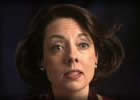TV AND RADIO INTERVIEWS
National Public Radio (NPR)
All Things Considered. May 8, 2000
ANALYSIS: CRITICS ARGUE US IS FAR FROM BLAMELESS FOR RUSSIA'S TROUBLES AS IT HAS TRIED TO MOVE BEYOND ITS COMMUNIST PAST
LINDA WERTHEIMER, host: This is NPR's ALL THINGS CONSIDERED. I'm Linda Wertheimer.
NOAH ADAMS, host: And I'm Noah Adams.
Secretary of State Madeleine Albright has said, `Russia is Russia's to lose.' But the United States has played a political role in the path that post-Soviet Russia has taken and cannot escape some of the blame. And beyond the walls of the State Department there is growing criticism of US mistakes and lost chances in its relationship with Russia.
With the inauguration of President Vladimir Putin yesterday, NPR, in conjunction with "Frontline" explores the twists and turns of US-Russian policy since the collapse of the Soviet Union nearly a decade ago. NPR's Anne Garrels reports how trying to impose economic reforms from above without first building institutions in a national consensus has threatened Russia's experiment in democracy and strained US-Russian relations.
ANNE GARRELS reporting:
When the Soviet Union fell apart, the newly-independent Russia was burdened by old debts and new challenges. Dismantling the Soviet Union proved much easier and surprisingly more peaceful than building a new democratic Russia. Experts were confronted with a vast country which didn't have a recognizable monetary system let alone the institutions to back it up.
Boris Fyodorov, a finance minister under President Boris Yeltsin, says transforming Russia and integrating it into the global economy has proved much more complicated than anyone thought.
Mr. BORIS FYODOROV (Finance Minister Under President Boris Yeltsin): Ten years ago, I think everybody was much more euphoric and enthusiastic because at that time things looked pretty simple. You just try to create democracy and stock market reforms and everything will be going like a knife in the butter. But unfortunately, all these basically naive, idealistic things were not proved true and most things happened in a haphazard way, an ugly way, with a lot of corruption, with a lot of bad things happening in between. So I'm much less enthusiastic, unfortunately, than I used to be 10 years ago.
GARRELS: From the beginning, the US government took an active role in advising Russia on how to move forward. Strobe Talbott, now deputy secretary of State, took on the Russia portfolio for the Clinton administration.
Mr. STROBE TALBOTT (Deputy Secretary of State): We're making this up as we go along in a very real sense and we're gonna make some mistakes and Lord knows that the people we're trying to help are gonna make some mistakes.
GARRELS: The US government encouraged the freeing of prices, the process of privatization and the creation of unfettered capitalism in the belief that the rule of law, civil society and representative democracy would follow.
Viktor Kremenyuk, an analyst with the USA Canada Institute, believes Washington's blind focus on economic reform and on Boris Yeltsin as the engine of that reform was the mistake that was repeated again and again.
Mr. VIKTOR KREMENYUK (Analyst, USA & Canada Institute): Instead of supporting democratic institutions, democratic parties, democratic press, democratic people with democratic beliefs, the US government has preferred to support Mr. Yeltsin in whatever he was doing.
GARRELS: That included backing President Yeltsin in his confrontation with the elected Parliament, or duma, in 1993. Deputies had balked at Yeltsin's economic shock therapy. It turned violent. Yeltsin sent in troops to storm the Parliament building.
Mr. TALBOTT: It wasn't pretty. It was ugly.
GARRELS: Strobe Talbott.
Mr. TALBOTT: It was sometimes bloody, but as long as the prevailing instinct was in the direction of reform and doing things differently and letting the people decide, it was something that the United States, in broad-brush terms, could support.
GARRELS: But critics of US policy would argue, the Russian people were not allowed to decide.
Later that year with the economy crippled by hyperinflation, soaring prices and the collapse of industry, Russian voters rejected Yeltsin's policies. The Clinton administration was surprised by the results of the Parliamentary election. Vice President Al Gore was on his way to Moscow for what was supposed to be a triumphal moment for Yeltsin and his US backers.
Wayne Merry, a diplomat at the US Embassy, recalls frantic discussions about how to respond.
Mr. WAYNE MERRY (Diplomat, US Embassy): After some consultations over the secure telephone, obviously with the president and other senior officials, the American reaction was to tell the Russian government, `Let's basically ignore the election and get on with the program.'
GARRELS: A priority of US policy was putting state property into private hands as quickly as possible. Privatization was largely decided by presidential decrees, many of which were drafted by American officials who offered millions of dollars in aid.
In the rush to break up the state, Janine Wedel, an anthropologist at the University of Pittsburgh, says ordinary Russians were cheated.
Ms. JANINE WEDEL (Anthropologist, University of Pittsburgh): The way in which privatization was conducted was more about wealth confiscation than wealth creation. It was more about giving advantages to a very small group of power brokers, oftentimes referred to in the West as oligarchs.
GARRELS: The second round of privatization, known as loans for shares, was even more controversial. Prominent Russian businessmen were given cut-rate shares in the country's remaining assets, in return for loans to the government, which was badly in need of money.
Again, Boris Fyodorov.
Mr. FYODOROV: It was a disgusting exercise of a crony capitalism where normal investors were not invited, where even among Russian so-called investors only those who were friends of certain people in the government were invited, and there is a big suspicion that no real cash came to the government.
GARRELS: Wayne Merry says the US has to accept some responsibility for the creation of the so-called oligarchs.
Mr. MERRY: I know there has been a more recent tendency by spokesmen from the IMF, from US Treasury to claim that this was really all things Russia did to itself, but in the early post-Soviet era, there is no question that Washington, both through the IMF and the US Treasury, played an enormous role in determining what kinds of economic policies would be created, what kind of winners and losers there would be.
GARRELS: Merry says the US had a choice: to look the other way while deals of colossal scale that simply could not be legal were taking place, or it could energetically try to investigate what was going on. Merry says it looked the other way.
Mr. MERRY: We created a virtual open shop for thievery at a national level and for capital flight in terms of hundreds of billions of dollars.
GARRELS: Vice President Al Gore who regularly met with then Prime Minister Viktor Chernomyrdin, one of the wealthiest men in Russia, dismissed CIA reports about corruption at the highest levels.
Viktor Kremenyuk says the Gore-Chernomyrdin meeting did nothing to encourage transparency, accountability or clean government.
Mr. KREMENYUK: It has become a good boys club--very limited, no one is permitted in, only for the chosen. They meet regularly. They discuss something--not always publishing the results--and they were so reluctant to issue anything out.
GARRELS: President Clinton had early on put Russia at the top of his foreign policy agenda. There was pressure to create the image of success, even when there was little to cheer about.
Don Jensen(ph), a political officer in the embassy at the time who has since resigned in protest, says within the State Department the policy was hotly debated.
Mr. DON JENSEN (Former Embassy Political Officer): When we would ask how, in these internal debates, if there's no adequate protection of property rights, if democratic institutions are relatively weak and, in fact, these reforms are rammed through by presidential decree, which have the effect of further weakening democratic institutions, how can we both build a democracy and have a free market at the same time, there was never a good answer to that and I don't think there's a good answer today.
GARRELS: As Russian presidential elections loomed in 1996, the overriding fear was that the Communists would return to power. Determined that President Yeltsin be re-elected, the administration chose to ignore the loans for share scandal, the first brutal war in Chechnya and the growing evidence of corruption, which was clear in the presidential campaign itself. The anticipated ends justified the means.
But Yevgenya Albatz(ph), an independent journalist, says it didn't get better.
Ms. YEVGENYA ALBATZ (Independent Journalist): Obviously, to have Yeltsin as a president was better than to have Zyuganov, a Communist leader, as a president, but the outcome was just the same as always; more corruption, more power to oligarchs, exhausted budget. All that eventually led to the August 1998 collapse.
GARRELS: Yeltsin's second and last term were lost years.
Many Russians don't want to face up to their own responsibility for what happened, particularly the political elites--choosing to blame Americans for the crime, chaos and economic hardship they have suffered. But Wayne Merry says growing anti-American sentiment was understandable.
Mr. MERRY: There was a great deal of a sense that the Americans, whom they had perceived to be idealistic principled and things, in fact, that no government ever actually is, were then increasingly seen to be unprincipled, conspiratorial, manipulative and excessively identified with whatever were the actual power centers in Russia.
GARRELS: Viktor Kremenyuk says the expansion of NATO closer to Russia's borders simply increased suspicions the United States was only interested in weakening Russia.
Mr. KREMENYUK: That has left, of course, deep scars among different Russians. The Russians who were pro-Western, they felt being betrayed. The Russians who were never pro-Western and said, `Ah, they were triumphant. Ah-ha you see, you know, they are the enemies.'
GARRELS: The honeymoon between the US and Russia is over and that's a fact that will have to be faced by this administration and those which succeed it.
Strobe Talbott is preparing President Clinton's meeting with President Vladimir Putin, scheduled for June.
Mr. TALBOTT: We're gonna have to grapple head-on with this problem of Russian attitudes towards the United States and I think the best way to do it is for us to be absolutely honest with them about what we're for and what we're against and why there are certain things that are going on in Russia we can support and other things that we're gonna have to oppose.
GARRELS: But today Russians are no longer in the mood to listen to what they now perceive as arrogant advice from abroad. The Russia that President Vladimir Putin took command of this week faces questions it has not yet answered: how much it wants to be like the West; how it wants to be integrated into the world community and just what it's fundamental national interests are.
Russia isn't lost, but it is floundering. Almost a decade after the fall of communism, the true democracy and prosperity Russians had hoped for remains elusive.
Yevgenya Albatz says the years of great illusions are over.
Ms. ALBATZ: Probably it would take another generation--probably the generation of my daughter or her kids--to take another stand for creating, you know, some civilized and democratic society in Russia.
GARRELS: Anne Garrels, NPR News, Moscow.
ADAMS: This report is part of an NPR series on Russia Today, reported in collaboration with "Frontline." "Frontline's" documentary airs on selected PBS stations Tuesday evening.


